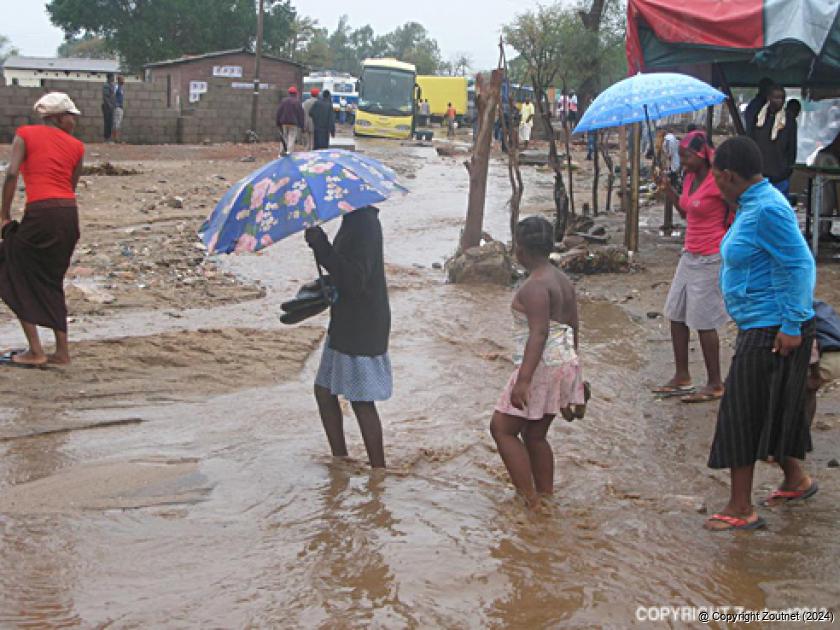

ADVERTISEMENT:

Heavy rains cause floods at Beit Bridge
Several Beit Bridge residents were left stranded after heavy rains in the border town flooded their homes, resulting in some losing their belongings.
The worst affected were residents living around the Dulibadzimu bus terminus, which is situated in a low-lying area.
The heavy rains started on Friday last week at around 05:00 until around midday, and the bus terminus area remained waterlogged for the better part of the day, forcing the Beit Bridge Town Council to relocate it temporarily to higher ground.
Vagrants and the street beggars who live around the area adjacent to the bus terminus were not spared as water, which flowed down a stream that feeds into the Limpopo River, swept away their belongings, creating a mini-humanitarian crisis. Their food and belongings were washed away in the flood.
By midday, cross-border buses, cars and local taxis remained stuck in the muddy waters at the bus terminus while the pre-cast wall was swept away by the floods. Some local motorists were seen clearing the drainage system along the road leading to Dulibadzimu as they sought to clear the flooded roads that badly affected the flow of traffic.
The downpour also destroyed key roads around the border town, with some becoming virtually impassable.
The Beit Bridge town secretary, Dr Sipho Singo, said close to 100 families were affected by the floods. He attributed the development to the poor drainage system, saying the local authority was in the process of addressing the problem. “The people affected most are those whose dwellings were constructed in a low-lying area with poor drainage, and we want to address that challenge,” he said.
Singo said they had started digging deeper trenches to divert the flow of water at the bus terminus and houses around the same area. He said residents staying in the low-lying areas would be allocated new residential stands in a new suburb, pending the demolition of the old buildings.
“The problem of water logging is being attended to urgently and we hope to contain the flow of the water within a few weeks. We have already bought equipment, including pipes, to divert the flow of the water into Wamlala stream without water-logging the terminus, which is located in a low-lying area. Our personnel are digging the trenches along which water will flow directly into the Limpopo River,” he added.
Singo said they had towed away buses that had been stuck in the mud, adding that they had since temporarily relocated the bus terminus, pending the laying of drainage pipes at Dulibadzimu bus terminus.
When Limpopo Mirror visited some of the affected homes in Dulibadzimu suburb, residents were busy scooping water out of their houses while others were busy removing soaked household property out of their rooms.
One of the affected residents, Mr Jacob Gumuro, said: “By 07:00, most of our houses were flooded with water at knee-high level. We started throwing most of our belongings out through the window, with some of them being swept away by the flood. Our food supplies were also destroyed. We hope the local authority will address this problem as a matter of urgency, so that we don’t have a recurrence of such incidents, particularly taking into consideration that the rain season has started,” he said.
Another resident, Mrs Selina Muleya, said other residents had to take their children out of the flooded houses through the windows. “I was lucky that my 18-month-old baby didn’t drown as some residents helped me take her out of the house through the window. I lost my clothes, food stuff and a few other belongings, however, after they were washed away by the flood,” she said.
News - Date: 26 October 2012

Recent Articles
-

From sportscaster to advocate
21 April 2024 By Silas Nduvheni -

New lab welcomed by Bungeni learners
20 April 2024 By Thembi Siaga -

Rialivhuwa and Sally are king and queen
20 April 2024 By Kaizer Nengovhela -

'Headman demolished my house'
20 April 2024 By Kaizer Nengovhela
Search for a story:

ADVERTISEMENT


Mashudu Netsianda
Mashudu Netsianda is our correspondent in Beit Bridge, Zimbabwe. He joined us in 2006, writing both local and international stories. He had worked for several Zimbabwean publications, as well as the Times of Swaziland. Mashudu received his training at the School of Mass Communication in Harare.

ADVERTISEMENT:

